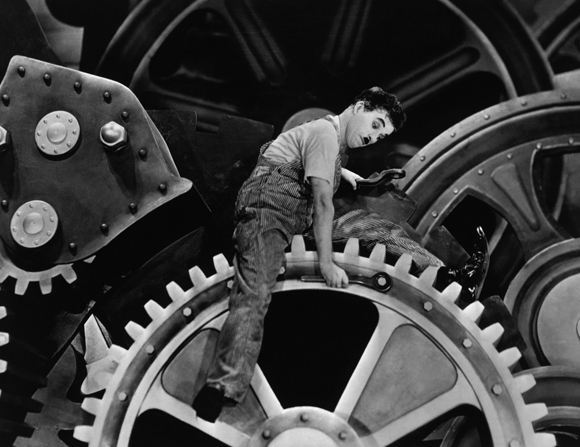(1936) Written and Directed by Charlie Chaplin; Starring: Charlie Chaplin, Paulette Goddard; Available Formats: DVD & Blu-Ray
Rating: *****
Today’s posting of Classics Revisited is first in a monthly examination of classic films, culled directly from the Cinematic Catharsis Archives (Sounds better than “my personal collection,” don’t you think?). This feature will spotlight some unanimously heralded masterpieces (such as Modern Times), along with a few personal favorites that I regard as classics.



Today’s posting of Classics Revisited is first in a monthly examination of classic films, culled directly from the Cinematic Catharsis Archives (Sounds better than “my personal collection,” don’t you think?). This feature will spotlight some unanimously heralded masterpieces (such as Modern Times), along with a few personal favorites that I regard as classics.
What’s It About?
Modern Times was filmed during the Great Depression, and reflects the sentiments and anxieties of that era. This was to be Charlie Chaplin’s swan song as his enduring character, the Little Tramp, who appeared in numerous feature films and two-reelers during the silent age. Modern Times was something of an anomaly when it was released, due to the fact that it was effectively a silent film, with intertitles in place of dialogue during most scenes. There were a few snippets of dialogue scattered throughout, along with sound effects and a rousing score (also written by Chaplin) to remind us that this was, begrudgingly, a product of the sound era.

We witness the Little Tramp as he drifts from one job to another, into jail and out of jail, never seeming to fit in with the rest of society. His discomfort adjusting to the industrial age appears to mirror Chaplin’s own anxieties about starring in the talkies. The Little Tramp can’t seem to find his place in a world that has rapidly changed. That is, until he befriends a young woman simply known as The Gamine (played by his real-life love interest of the time, Paulette Goddard). They forge a strange but effective alliance as they face the uncertainties of survival in the city. The Little Tramp’s bittersweet misadventures illustrate how Chaplin strikes a perfect balance between comedy and drama that is often pursued but rarely achieved.

Why It’s Still Relevant:
Modern Times is not simply a document of a bygone era, or an oldie moldy artifact of film history. It’s nearly impossible to view this film exclusively in the context of the Great Depression, but through the lens of our troubled present day. Like the Little Tramp, we are still striving for individualism when our humanity and personal freedom is continually being stripped away. In scenes that seem to envisage Orwell’s 1984, which was written 12 years later, nothing eludes the watchful eye of the factory president, whose face appears on large screens scattered throughout his plant. In another scene, the Little Tramp is a guinea pig for a new automated feeding machine, designed to increase worker efficiency by reducing idle time. At its darkest, Modern Times suggests that we are only cogs in a much larger machine -- a theme that would be echoed again and again, most recently in Brazil, Dark City and The Matrix.

The comedic scenes have a decidedly contemporary feel. What was funny then, is just as funny today. Chaplin seemed to elude the Hays Code censors, or at least thumb his nose at them. At one point, the Little Tramp suffers a nervous breakdown in the factory and begins to tighten every nut he can get his wrench around, including some strategically placed buttons on women’s outfits. Even more surprising is a scene that takes place in prison, when the incarcerated Little Tramp unwittingly ingests cocaine (referred to as “nose powder” in the film) from another inmate, leading to unexpectedly hilarious results. These scenes, among others, are timeless reminders that comedy does not necessarily exist in a contextual bubble, accessible only to viewers from a time gone by. An effective comedy works in any era.
The final shot is a fitting and poignant ending for one of the most iconic characters in film. Chaplin acknowledges that the Little Tramp is an anachronism, approaching obsolescence. It’s as if Chaplin is stating, to quote a Beach Boys’ song title, “I Just Wasn’t Made For These Times.” This might be so, but we’re fortunate to have been taken along for the ride.


Great review of a great film. It's a tough choice, but this is probably my favorite Chaplin film. I, too, was surprised the "nose powder" scene made it past the censors. Did you notice that what sound there was in the film was almost always generated my mechanical means? (loudspeaker, phonograph record, etc.)
ReplyDeleteWhat a lovely review. I agree with your assessment that it is still relevent today. That is something which kept strinking me when I watched it for the first time. I'm not sure that this is my favourite Chaplin (i'm currently watching and reviewing every film he made) but it is certainly very close to the top of the list.
ReplyDeleteThanks so much Tom! This is the movie that introduced me to Chaplin and the silent (well, mostly silent) films when I was in college. I guess you could say Modern Times was my gateway drug. :)
ReplyDelete